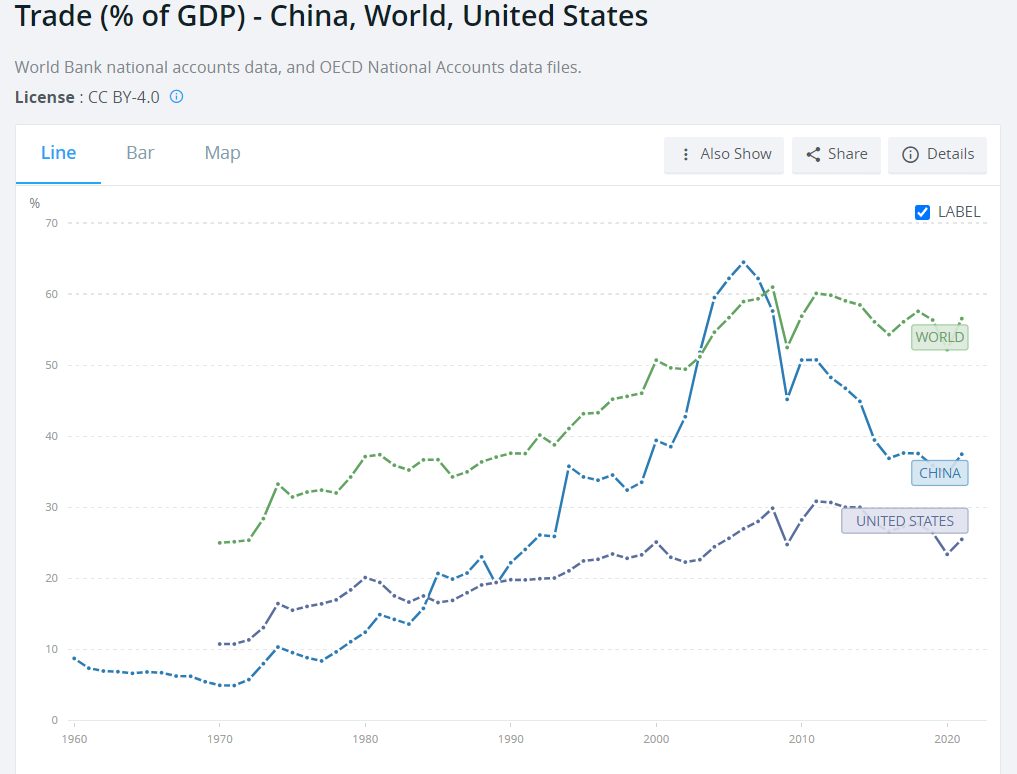Greenland And China: Are Trump's Fears Justified?

Table of Contents
China's Growing Interest in Greenland's Resources and Infrastructure
China's interest in Greenland stems largely from its vast reserves of rare earth minerals and its strategic geopolitical location. These rare earth minerals are crucial for technological advancements in various sectors, from smartphones to military hardware, making Greenland a highly attractive target for Chinese investment.
-
Rare Earth Minerals: Greenland possesses significant deposits of rare earth elements, including dysprosium and neodymium, essential components in high-tech manufacturing. China currently dominates the global rare earth market, and securing access to Greenland's resources would enhance its technological dominance and reduce its reliance on other suppliers. This aspect alone fuels China's interest in Greenland.
-
Infrastructure Investment: China has shown a keen interest in investing in Greenland's infrastructure. This includes port development, which would significantly improve access for Chinese shipping and potentially shorten trade routes between Asia and Europe via the Arctic. The potential for increased Arctic shipping routes is a significant factor driving Chinese investment.
-
Economic Benefits and Risks for Greenland: While these investments offer substantial economic benefits to Greenland, including job creation and revenue generation, they also pose risks. Over-reliance on a single investor, particularly one with significant geopolitical leverage, could compromise Greenland's autonomy and leave it vulnerable to external pressures.
-
Strategic Importance of Arctic Shipping Routes: The melting Arctic ice cap is opening up new shipping routes, drastically reducing travel times and costs between Asia and Europe. Control or significant influence over these routes offers a major strategic and economic advantage for any nation, explaining the global competition for influence in the Arctic.
Geopolitical Implications of Chinese Engagement in Greenland
China's engagement in Greenland has significant geopolitical implications, particularly for the United States. The Arctic region is increasingly viewed as a strategic zone, and any nation gaining significant influence there could impact the global balance of power.
-
Implications for US National Security: A strong Chinese presence in Greenland, including access to infrastructure and resources, could pose challenges to US national security. This includes potential surveillance capabilities, access to strategic shipping lanes, and the possibility of future military expansion.
-
Challenges to Arctic Sovereignty: Increased Chinese influence raises concerns about the sovereignty of Arctic nations, including Greenland and its relationship with Denmark. The potential for disputes over resources and territorial claims increases with the growing interest in the region's economic potential.
-
Potential for a Chinese Military Presence: While there is no currently confirmed Chinese military presence in Greenland, the potential for establishing a military base or gaining access to military-relevant infrastructure is a significant concern for the US and its allies. This potential directly affects the regional and global balance of power.
-
Counter-Strategies: The US and its allies are employing various counter-strategies, including increased diplomatic engagement with Greenland, enhanced military presence in the Arctic, and economic development initiatives aimed at providing alternative investment options for Greenland.
Greenland's Strategic Position and its Autonomy
Greenland's autonomous status within the Kingdom of Denmark adds another layer of complexity. Its strategic location and resource wealth make it a key player in Arctic geopolitics, but its economic dependence on Denmark presents a challenge.
-
Greenlandic Autonomy: Greenland's self-governance allows it to manage its internal affairs, but its foreign policy and defense remain the responsibility of Denmark. This complex relationship complicates its interactions with other world powers, like China.
-
Economic Diversification: Greenland seeks to diversify its economy, reducing its reliance on fisheries and exploring other opportunities like tourism and renewable energy. This diversification is vital to ensuring economic stability and reducing dependence on extractive industries.
-
Balancing Economic Needs with Geopolitical Considerations: Greenland faces the difficult task of balancing its economic needs with the potential risks associated with accepting foreign investment, particularly from a nation with such geopolitical weight as China. This balance is a constant challenge in navigating the complexities of its relationships with global powers.
-
Sustainable Development: Promoting sustainable development models reduces reliance on extractive industries, safeguarding the environment, and building a more resilient economy. This approach promotes long-term economic stability while minimizing environmental damage.
The Role of the United States in the Arctic
The US plays a crucial role in Arctic geopolitics, particularly concerning its relationship with Greenland. The US strategy involves a multi-pronged approach.
-
US Arctic Strategy: The US is actively engaged in developing a comprehensive Arctic strategy, focusing on diplomatic engagement, military presence, and economic development initiatives. These initiatives often involve cooperation with other Arctic nations and seek to counterbalance Chinese influence.
-
US Military Presence: The US maintains a military presence in the Arctic, which is strategically important to monitor the region and respond to potential threats. This presence acts as a deterrent to any potential aggressive action from other global actors.
-
Diplomatic Initiatives: The US actively engages in diplomatic efforts to strengthen relationships with Greenland and other Arctic nations, promoting cooperation and countering Chinese influence through diplomacy and engagement.
-
Economic Assistance Programs: The US might offer economic assistance programs to Greenland to support sustainable development and diversify its economy, presenting viable alternatives to Chinese investment.
Conclusion
The relationship between Greenland and China is complex and fraught with geopolitical implications. While Trump's concerns about Chinese influence may have been initially dismissed by some, a closer examination reveals significant potential risks for the US and its allies. The strategic importance of Greenland's resources and its location in the increasingly accessible Arctic demands careful consideration. Continued vigilance and nuanced policymaking are essential for navigating this challenging landscape. Further research into the evolving situation regarding Greenland and China is vital to fully understand the implications of this dynamic relationship. Stay informed on the developments surrounding Greenland and China to ensure a comprehensive understanding of this crucial region.

Featured Posts
-
 Official Play Station Podcast Episode 512 True Blue Key Takeaways And Analysis
May 08, 2025
Official Play Station Podcast Episode 512 True Blue Key Takeaways And Analysis
May 08, 2025 -
 Fitorja E Ngushte E Psg Se Shqyrtim I Pjeses Se Pare
May 08, 2025
Fitorja E Ngushte E Psg Se Shqyrtim I Pjeses Se Pare
May 08, 2025 -
 Brazil Approves First Spot Xrp Etf Ripple Xrp News And Trumps Support
May 08, 2025
Brazil Approves First Spot Xrp Etf Ripple Xrp News And Trumps Support
May 08, 2025 -
 De Andre Jordans Milestone A Historic Game For The Nuggets
May 08, 2025
De Andre Jordans Milestone A Historic Game For The Nuggets
May 08, 2025 -
 Are 67 Million In Ethereum Liquidations A Sign Of Further Price Drops
May 08, 2025
Are 67 Million In Ethereum Liquidations A Sign Of Further Price Drops
May 08, 2025
Latest Posts
-
 Sht Ky Dykh Bhal Lahwr Hayykwrt Awr Dley Edlyh Ke Jjz Ke Lye Nyy Shwlt
May 08, 2025
Sht Ky Dykh Bhal Lahwr Hayykwrt Awr Dley Edlyh Ke Jjz Ke Lye Nyy Shwlt
May 08, 2025 -
 Dley Edlyh Awr Hayykwrt Jjz Ke Lye Tby Anshwrns Ka Prwgram
May 08, 2025
Dley Edlyh Awr Hayykwrt Jjz Ke Lye Tby Anshwrns Ka Prwgram
May 08, 2025 -
 The Great Decoupling And The Future Of Globalization
May 08, 2025
The Great Decoupling And The Future Of Globalization
May 08, 2025 -
 Lahwr Ke Jjz Kw Sht Ky Nyy Bymh Shwlt
May 08, 2025
Lahwr Ke Jjz Kw Sht Ky Nyy Bymh Shwlt
May 08, 2025 -
 Lahwr Ke Telymy Adarwn Ka Py Ays Ayl Ke Dwran Nya Shydwl
May 08, 2025
Lahwr Ke Telymy Adarwn Ka Py Ays Ayl Ke Dwran Nya Shydwl
May 08, 2025
